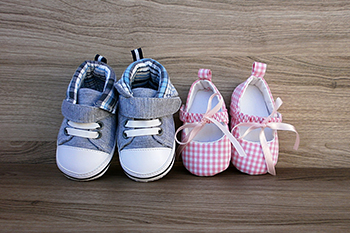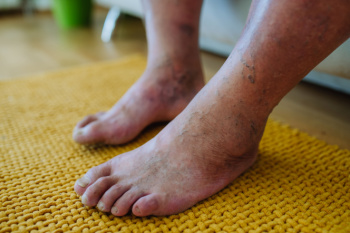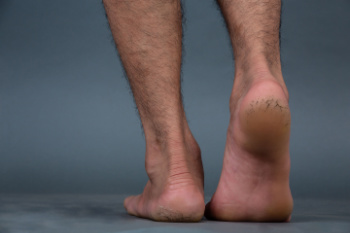Items filtered by date: June 2024
How Being Overweight Affects the Feet

Excess weight does not just affect your waistline, it also can have a significant impact on the health of your feet. Studies have consistently shown a strong correlation between being overweight and various foot problems. Carrying extra pounds puts undue stress on the feet and can lead to plantar fasciitis, osteoarthritis, and even stress fractures. Research indicates that people with a higher body mass index, or BMI, are more likely to endure foot pain and disability that affects their ability to exercise and perform daily activities. Obesity alters the gait and increases the risk of joint injuries in the ankles, knees, and hips. Research reveals a stark increase in the likelihood of needing a knee replacement as the BMI rises. Managing weight through healthy diet choices and regular physical activity reduces the strain on your feet, thereby reducing the risk of developing debilitating foot conditions. Practicing good foot hygiene, wearing proper footwear, and seeking professional foot care from a podiatrist are methods to prevent and alleviate foot pain from obesity. If you are overweight and experiencing foot problems, it is suggested that you schedule an appointment with a podiatrist for treatment options.
The more you weigh, the harder your feet must work to support your body. If you’re an obese individual and are concerned about your feet, contact Dr. Richard T. Bauer from Summit Foot & Ankle. Our doctor can provide the care you need to keep you pain-free and on your feet.
Obesity and Your Feet
People who are overweight are putting more pressure on their ankles, knees, and hips as well as their feet. This unfortunately can lead to variety of different issues.
Problems & Complications Stemming from Obesity
- When the body is overweight, it tries to compensate by changing the way that it moves. An obese person may lean forward and put extra weight on the wrong part of the foot. This puts unnecessary stress on the feet.
- Obese people are also more likely to develop type II diabetes which is a condition that causes a lot of foot problems. People with diabetes often don’t feel the cuts and sores that they may have on their feet, which can lead to more complicated and severe issues.
- Plantar fasciitis is another foot condition that can be caused by obesity. Plantar fasciitis is an inflammation of the tissue along the bottom of the foot, which causes pain and stiffness while walking and climbing stairs.
If you have any questions, please feel free to contact our office located in Latham, NY . We offer the newest diagnostic and treatment technologies for all your foot care needs.
Are You Suffering From Ingrown Toenails?
Babies First Shoes

Selecting the first shoes for babies is an important decision, as it impacts their comfort and foot development. Opt for soft, flexible shoes made from breathable materials like leather or cloth, allowing natural movement and airflow. These materials provide gentle support without restricting the foot's growth. Look for shoes with a roomy toe box to accommodate the baby's developing toes and allow wiggle room. Flexible soles with good traction help prevent slipping while allowing for natural foot movement. Additionally, avoid shoes with stiff soles or tight, rigid structures, as they can hinder proper foot development and cause discomfort. Velcro or elastic closures ensure a snug fit without being too restrictive, making it easier to put on and take off. If you notice anything unusual about your child’s feet, it is suggested that you consult a podiatrist who can provide a comprehensive exam and address any questions you may have about appropriate footwear.
Making sure that your children maintain good foot health is very important as they grow. If you have any questions, contact Dr. Richard T. Bauer of Summit Foot & Ankle. Our doctor can provide the care you need to keep you pain-free and on your feet.
Keeping Children's Feet Healthy
Having healthy feet during childhood can help prevent medical problems later in life, namely in the back and legs. As children grow, their feet require different types of care. Here are some things to consider...
Although babies do not walk yet, it is still very important to take care of their feet.
Avoid putting tight shoes or socks on his or her feet.
Allow the baby to stretch and kick his or her feet to feel comfortable.
As a toddler, kids are now on the move and begin to develop differently. At this age, toddlers are getting a feel for walking, so don’t be alarmed if your toddler is unsteady or ‘walks funny’.
As your child gets older, it is important to teach them how to take care of their feet.
Show them proper hygiene to prevent infections such as fungus.
Be watchful for any pain or injury.
Have all injuries checked by a doctor as soon as possible.
Comfortable, protective shoes should always be worn, especially at play.
If you have any questions please feel free to contact our office located in Latham, NY . We offer the newest diagnostic and treatment technologies for all your foot and ankle needs.
Fear of Falling Among Diabetics
 Diabetic foot problems and the fear of falling are significant concerns for individuals managing diabetes. Diabetes can lead to various complications, including neuropathy and peripheral vascular disease, or PAD, which affect sensation and blood flow to the feet. As a result, individuals with diabetes may experience decreased balance, altered gait, and diminished sensation, increasing their risk of falls. Furthermore, diabetic foot complications, such as foot ulcers and infections, can further impair mobility and increase the fear of falling. The fear of falls can lead to decreased physical activity and social isolation, impacting overall quality of life. To address these concerns effectively, it is suggested that individuals with diabetes include a podiatrist as part of their healthcare team. Podiatrists specialize in foot care and can assess and manage diabetic foot complications, provide preventive measures, and offer guidance to reduce the risk of falls.
Diabetic foot problems and the fear of falling are significant concerns for individuals managing diabetes. Diabetes can lead to various complications, including neuropathy and peripheral vascular disease, or PAD, which affect sensation and blood flow to the feet. As a result, individuals with diabetes may experience decreased balance, altered gait, and diminished sensation, increasing their risk of falls. Furthermore, diabetic foot complications, such as foot ulcers and infections, can further impair mobility and increase the fear of falling. The fear of falls can lead to decreased physical activity and social isolation, impacting overall quality of life. To address these concerns effectively, it is suggested that individuals with diabetes include a podiatrist as part of their healthcare team. Podiatrists specialize in foot care and can assess and manage diabetic foot complications, provide preventive measures, and offer guidance to reduce the risk of falls.
Diabetic foot care is important in preventing foot ailments such as ulcers. If you are suffering from diabetes or have any other concerns about your feet, contact Dr. Richard T. Bauer from Summit Foot & Ankle. Our doctor can provide the care you need to keep you pain-free and on your feet.
Diabetic Foot Care
Diabetes affects millions of people every year. The condition can damage blood vessels in many parts of the body, especially the feet. Because of this, taking care of your feet is essential if you have diabetes, and having a podiatrist help monitor your foot health is highly recommended.
The Importance of Caring for Your Feet
- Routinely inspect your feet for bruises or sores.
- Wear socks that fit your feet comfortably.
- Wear comfortable shoes that provide adequate support.
Patients with diabetes should have their doctor monitor their blood levels, as blood sugar levels play such a huge role in diabetic care. Monitoring these levels on a regular basis is highly advised.
It is always best to inform your healthcare professional of any concerns you may have regarding your feet, especially for diabetic patients. Early treatment and routine foot examinations are keys to maintaining proper health, especially because severe complications can arise if proper treatment is not applied.
If you have any questions please feel free to contact our office located in Latham, NY . We offer the newest diagnostic and treatment technologies for all your foot and ankle needs.
Understanding and Preventing Cracked Heels

Cracked heels occur when the skin on the heels becomes dry, thickened, and fissured, often leading to discomfort and cosmetic concerns. This condition, medically known as heel fissures, can result from various factors, including dehydration, prolonged standing, wearing open-back shoes, or inadequate foot care. The skin on the heels lacks oil glands, making it prone to dryness and cracking, especially in dry climates or during colder months. To prevent cracked heels, it is essential to maintain proper foot hygiene by regularly moisturizing the heels with a hydrating foot cream or lotion. Exfoliating the heels gently to remove dead skin buildup and wearing supportive footwear that protects the heels can also help prevent the formation of cracks. Additionally, staying hydrated, maintaining a balanced diet rich in vitamins and minerals, and avoiding excessive standing or walking barefoot can contribute to overall foot health and prevent cracked heels from developing. Cracked heels can be painful. If you have developed this foot condition, it is suggested that you consult a podiatrist who can offer you effective treatment methods, which may include prescribed medication.
If the skin on your feet starts to crack, you may want to see a podiatrist to find treatment. If you have any concerns, contact Dr. Richard T. Bauer from Summit Foot & Ankle. Our doctor can provide the care you need to keep you pain-free and on your feet.
Cracked Heels
It is important to moisturize your cracked heels in order to prevent pain, bleeding, and infection. The reason cracked heels form is because the skin on the foot is too dry to support the immense pressure placed on them. When the foot expands, the dry skin on the foot begins to split.
Ways to Help Heal Them
- Invest in a good foot cream
- Try Using Petroleum Jelly
- Ease up on Soaps
- Drink Plenty of Water
Ways to Prevent Cracked Heels
- Moisturize After Showering
- Skip a Shower
- Keep Shower Water Lukewarm
- Don’t Scrub Your Feet
If you are unsure how to proceed in treating cracked heels, seek guidance from a podiatrist. Your doctor will help you with any questions or information you may need.
If you have any questions, please feel free to contact our office located in Latham, NY . We offer the newest diagnostic and treatment technologies for all your foot care needs.

